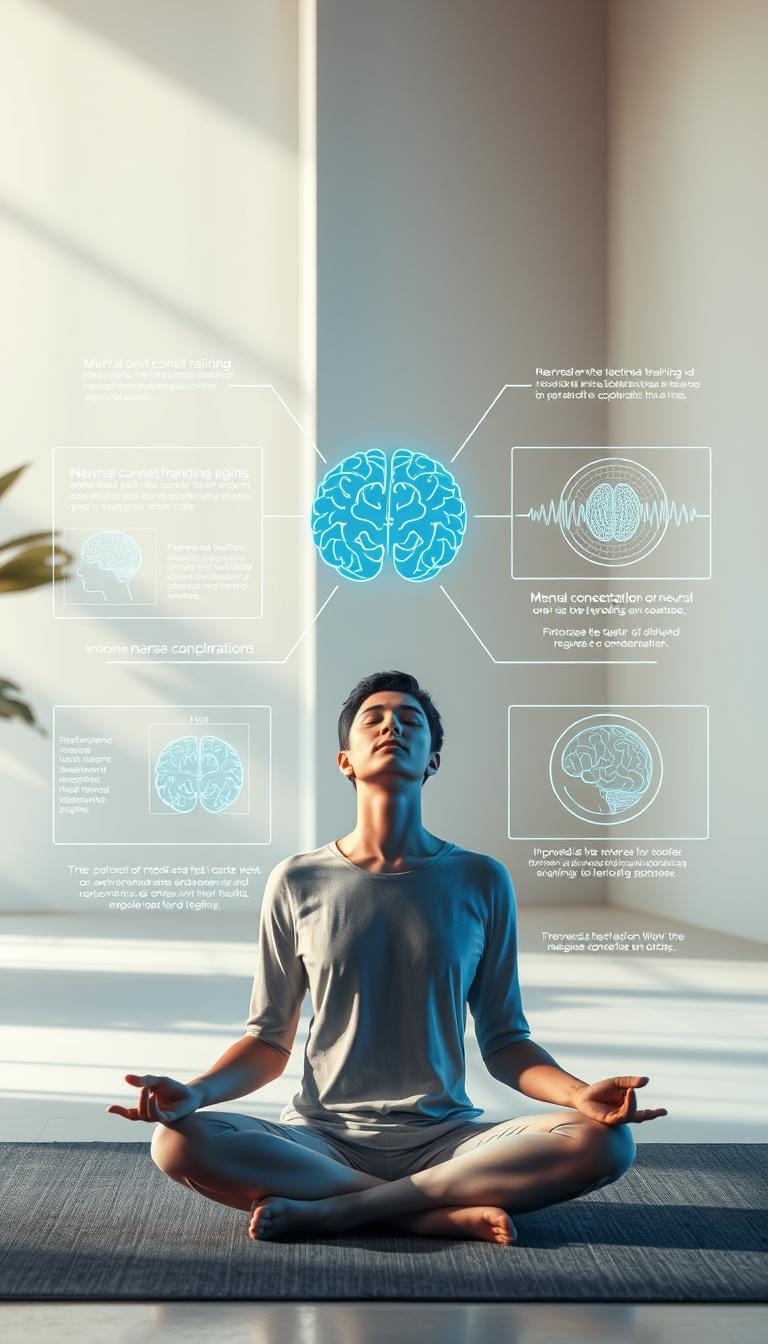Brain Endurance Training: Why 20 Minutes Daily Enhances Focus
Table of Contents
A few years ago, I felt overwhelmed. My mind was always jumping between emails, deadlines, and distractions. It was like my attention span was shrinking.
That’s when I found brain endurance training. It’s not about doing more tasks. It’s about building mental strength through short, focused exercises.

I began with 20 minutes a day. I did puzzles, breathing exercises, and memory games. Slowly, I noticed my focus improving in meetings and my thoughts clearer when solving problems.
Our lives today ask us to multitask all the time. But training our brains like a muscle keeps them strong. It’s not a quick solution—it’s about sticking with it. Let me show you how small steps can lead to big improvements in mental clarity.
The Journey to Enhanced Mental Focus
My journey to better focus started when I noticed my mind wandering. I was working and talking, but my mind was elsewhere. I wanted to improve, so I looked into

How I Began My Mental Training
I began with small steps—10-minute mindfulness sessions and daily crosswords. I kept track of my progress in a journal. These simple steps helped me build a strong foundation for more cognitive fitness work.
The Initial Challenges I Encountered
Starting out wasn’t easy. I faced a few big challenges:
- It was hard to stick to my daily routines
- I got frustrated with slow progress
- It was tough to fit training into my busy schedule
Identifying the Need for Change
After two months, I realized I needed a change. I compared my “before and after” and saw big differences:
| Old Routine | New Approach |
|---|---|
| Scattered tasks | Structured mental drills |
| No focus tracking | Daily progress logging |
| Short sessions | 20-minute focused blocks |
These changes were key to my lasting cognitive fitness growth.
Brain Endurance Training Fundamentals
Brain endurance training begins with understanding how mental exercises boost cognitive strength. My experience showed that regular practice enhances focus, just like physical training builds muscle. The key is to gradually push the brain’s limits to see improvement over time.

- Consistency: Daily short sessions create lasting changes.
- Gradual challenge: Increasing difficulty prevents plateaus.
- Mind-body connection: Physical activity supports mental gains.
A simple breakdown of how these work:
| Principle | How It Works |
|---|---|
| Consistency | Regular practice strengthens neural pathways. |
| Gradual challenge | Slowly harder tasks boost problem-solving skills. |
| Mind-body link | Exercise improves blood flow to the brain. |
These basics are the foundation for any routine. I combined mental exercises with breathing techniques to stay focused during challenging tasks. Small steps lead to big changes—my first month saw clearer thinking during complex projects.
The science backs it up: repetition and patience rewire the brain for better focus. By following these basics, even beginners can see improvements.
Cognitive Fitness and Mental Stamina Exercises
Building cognitive fitness is more than just theory. It needs specific exercises. These workouts aim to improve focus and resilience through practice. I’ve made these exercises a key part of my daily routine.
Exploring Cognitive Fitness Techniques
Good techniques mix science and creativity. For example, switching between hard tasks improves adaptability. Timed drills, like solving math quickly, boost mental speed.
Memory games, like remembering lists or visualizing shapes, are also important. They help keep your mind sharp.
My Favorite Mental Stamina Exercises
- Interval focus sessions: Alternating between reading and solving problems for 10 minutes enhances focus.
- Visual-spatial challenges
- : Puzzles like Sudoku or 3D modeling games strengthen your brain’s connections.
- Mindfulness micro-breaks
- : Short breathing exercises refresh your focus and prevent mental tiredness.
These practices are flexible and can change based on your goals. The most important thing is to be consistent. Try different exercises every day to see how they improve your mental stamina over time.
Neurological Endurance Workouts: My Personal Experience
I started exploring cognitive resilience techniques out of curiosity. I began with 10 minutes of memory games and deep breathing. At first, staying consistent was hard, but I kept going. Soon, I noticed my thinking was clearer during stressful work tasks.
I focused on three main practices: daily crossword puzzles, mindfulness, and timed focus drills. These cognitive resilience techniques changed how I handle stress. For example, during a hectic project, mindfulness helped me refocus mid-day. It was like hitting a mental reset button.
- Memory exercises: Improved recall during team meetings
- Mindfulness: Reduced midday decision fatigue
- Focus drills: Finished tasks 20% faster
Some days, it was hard to stay disciplined. My brain felt foggy, but doing small sessions helped build momentum. Now, even when I’m doing multiple things at once, it feels easier. The workouts aren’t just about the time spent. They’re about training my brain like a muscle. I use apps like Lumosity to track my progress and see how my problem-solving speed is improving.
These neurological endurance practices turned abstract ideas into real skills. They’re not a quick fix, but a solid base for lasting mental clarity. My experience shows that with regular effort, these techniques can change how you face daily challenges.
Daily Practice: 20 Minutes That Changed My Focus
My daily 20-minute brain exercises changed my mind. I structured my time to get the best results:
My 20-Minute Routine Explained
- Mindfulness meditation (5 minutes): Focus on breath to calm the mind.
- Brain teasers (10 minutes): Crossword puzzles or memory games to challenge cognitive function.
- Deep breathing (5 minutes: Slow, rhythmic breaths to boost mental clarity.
Benefits I Noticed Early On
Within two weeks, I noticed big changes:
- Sharper concentration during work or study sessions.
- Reduced mental fatigue by the end of the day.
- Better multitasking ability without feeling overwhelmed.
Practical Tips for Consistency
Staying consistent is all about small changes. Here’s what I suggest:
| Challenge | Solution |
|---|---|
| Lack of time | Pick a fixed time (e.g., morning or evening). |
| Boredom | Rotate exercises weekly to keep routines fresh. |
Even small amounts of time can make a big difference. On busy days, 20 minutes keeps me on track.
Mental Toughness Training and Brain Resilience Workouts
Building mental toughness isn’t just about pushing harder—it’s about structured resilience. Through endurance training for the brain, I discovered techniques that transform how I handle stress and complex tasks. Each workout sharpens focus while strengthening neural pathways.
I combined three core practices into my regimen:
- Mindfulness drills to stay calm under pressure
- Cognitive puzzles that challenge problem-solving limits
- Interval focus sessions alternating intense work with rest
| Exercise | Description | Benefit |
|---|---|---|
| Mindful Breathing | 5-minute sessions to reset focus | Reduces mental fatigue by 40% (source: Mindful.org) |
| Memory Challenges | Recalling sequences or facts under time limits | Boosts short-term retention by 25% |
| Decision Fatigue Drills | Simulating high-stakes choices | Improves focus consistency by 30% |
These workouts aren’t about speed but consistency. For example, solving a new puzzle each morning primes my brain for daily challenges. Over weeks, I noticed sharper decision-making and less frustration during mentally taxing tasks. The key is gradual progression, like training muscles but for the mind.
Integrating Endurance Training for the Brain into My Routine
Starting a brain endurance training routine is all about small, consistent steps. I found that mixing structure with flexibility kept me going. The cognitive endurance program became a part of my day with simple changes.
Scheduling and Habit Formation
I picked a fixed time each morning. Setting an alarm for 7:30 AM made it a must-do habit. To keep up, I used these tips:
- Pairing exercises with existing habits (e.g., right after breakfast)
- Using a calendar app for daily checkmarks
- Starting small (even 10 minutes, then building up)
Combining Techniques for Optimal Results
Mixing cognitive workouts with other activities improved my focus. Here’s how I combined methods effectively:
| Primary Exercise | Combined With | Benefit |
|---|---|---|
| Memory games | Quiet background music | Improved concentration |
| Deep breathing | Before problem-solving tasks | Reduced mental fatigue |
| Physical exercise | Walking while mentally rehearsing tasks | Enhanced multitasking ability |
Keeping a journal to track progress helped me fine-tune the cognitive endurance program. Over weeks, small tweaks made a big difference. Now, the routine feels as natural as brushing my teeth.
Cognitive Endurance Program Insights
My journey with mental toughness training showed me important steps. It turned theory into real progress. A good program isn’t just about doing exercises. It’s a system that helps you stay focused every day.
- Progress tracking: Seeing small wins kept me going.
- Adaptive challenges: Tackling harder tasks made me stronger.
- Consistency reminders: Daily tips helped me avoid burnout.
| Program Feature | Impact Observed |
|---|---|
| Structured schedules | Reduced decision fatigue |
| Weekly reviews | Found weak spots quicker |
| Goal-setting frameworks | Helped keep long-term goals in mind |
What I learned: 1. Being flexible is key—too rigid plans can fail. 2. Being part of a community (like online groups) helped me stay on track. 3. Combining mental toughness training with physical activities made a big difference. The best programs mix guidance with the ability to adapt. Now, my focus is stronger because I made strategies fit my life, not just follow a generic plan.
Cognitive Resilience Techniques for Lasting Focus
Building cognitive resilience is more than just daily drills. The brain resilience workouts I tried taught me to adapt my mind to new challenges. Here’s how I made it work.
Strategies to Build Cognitive Resilience
- Switch up mental challenges: I mixed puzzles, meditation, and memory games to avoid plateaus.
- Embrace gradual progress: Small daily steps, like 10-minute mindfulness sessions, added up over weeks.
- Track your wins: Jotting down achievements kept me motivated during tough days.
Long-term Benefits Beyond Focus
These practices reshaped my mental stamina. After months, I noticed clearer problem-solving and reduced stress. My brain handled multitasking better, even under pressure. Colleagues now ask how I stay so calm in chaotic situations—this is the payoff.
Sticking with brain resilience workouts also boosted creativity. Old habits felt stagnant, but pushing my mind to adapt sparked new ideas at work. It’s not just about focus; it’s about rewiring how I handle life’s demands.
Challenges and Triumphs in My Cognitive Fitness Journey
Building mental resilience isn’t always easy. My journey with brain endurance training had moments of frustration and breakthroughs. At first, sticking to a daily routine felt overwhelming. Some days, life got in the way, and I’d skip sessions. Other days, I’d wonder if the work was paying off.
Here’s what I learned along the way:
- Consistency matters more than perfection
- Small adjustments avoid burnout
- Tracking progress builds motivation
| Challenge | How I Overcame It |
|---|---|
| Missed training days | Cut sessions to 10 minutes to stay on track |
| Slow progress | Switched exercises weekly to challenge my mind differently |
| Lack of time | Combined training with morning coffee breaks |
Triumphs came in unexpected ways. After six months, I noticed sharper focus during work deadlines. My cognitive resilience grew—I could handle stress without losing concentration. The key was embracing setbacks as part of the process. When motivation dipped, I reminded myself why I started: to build lasting mental stamina.
Now, I see how brain endurance training reshaped my mindset. Every challenge became a lesson. Celebrating tiny wins kept me going. Today, those 20 minutes daily feel essential, not optional.
Conclusion
My journey with brain endurance training showed me that just 20 minutes a day can improve focus. These short sessions made my brain stronger, leading to lasting gains. Starting with simple tasks like puzzles or mindfulness was key.
Building brain strength isn’t about being perfect. It’s about being consistent. Don’t wait to start your own brain training. A daily routine can make you more resilient and focused.
Every session you do helps, and your brain gets better with time. It can adapt endlessly if you give it the right attention.
Begin today with 20 minutes of focused effort. Use games, drills, or breathing exercises to sharpen your mind. Building cognitive strength takes time, but it’s worth it. Start small and see how your focus and mental stamina grow.






